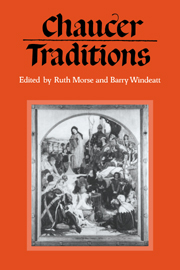Book contents
- Frontmatter
- Contents
- List of contributors
- Preface
- Note on the text
- 1 Chaucer traditions
- 2 Gower–Chaucer's heir?
- 3 Chaucer and Lydgate
- 4 Hoccleve and Chaucer
- 5 Chaucer and fifteenth-century romance: Partonope of Blois
- 6 Some Chaucerian themes in Scottish writers
- 7 The planetary gods in Chaucer and Henryson
- 8 Gavin Douglas: ‘Off Eloquence the flowand balmy strand’
- 9 Skelton's Garlande of Laurell and the Chaucerian tradition
- 10 Chaucerian metre and early Tudor songs
- 11 Aspects of the Chaucerian apocrypha: animadversions on William Thynne's edition of the Plowman's Tale
- 12 The shape-shiftings of the Wife of Bath, 1395–1670
- 13 The genius to improve an invention: transformations of the Knight's Tale
- 14 From the Clerk's Tale to The Winter's Tale
- 15 The Virtuoso's Troilus
- 16 Rewriting romance: Chaucer's and Dryden's Wife of Bath's Tale
- 17 Chaucer's religion and the Chaucer religion
- 18 A list of the published writings of Derek Brewer
- Index
1 - Chaucer traditions
Published online by Cambridge University Press: 23 September 2009
- Frontmatter
- Contents
- List of contributors
- Preface
- Note on the text
- 1 Chaucer traditions
- 2 Gower–Chaucer's heir?
- 3 Chaucer and Lydgate
- 4 Hoccleve and Chaucer
- 5 Chaucer and fifteenth-century romance: Partonope of Blois
- 6 Some Chaucerian themes in Scottish writers
- 7 The planetary gods in Chaucer and Henryson
- 8 Gavin Douglas: ‘Off Eloquence the flowand balmy strand’
- 9 Skelton's Garlande of Laurell and the Chaucerian tradition
- 10 Chaucerian metre and early Tudor songs
- 11 Aspects of the Chaucerian apocrypha: animadversions on William Thynne's edition of the Plowman's Tale
- 12 The shape-shiftings of the Wife of Bath, 1395–1670
- 13 The genius to improve an invention: transformations of the Knight's Tale
- 14 From the Clerk's Tale to The Winter's Tale
- 15 The Virtuoso's Troilus
- 16 Rewriting romance: Chaucer's and Dryden's Wife of Bath's Tale
- 17 Chaucer's religion and the Chaucer religion
- 18 A list of the published writings of Derek Brewer
- Index
Summary
The works of Chaucer gave rise to a diversity of traditions of both creative response and critical commentary, to subsequent ‘Chaucerian’ authors, and to a body of comment about Chaucer's writings, one of the longest continuous critical traditions in vernacular European literature. It was Chaucer who began it. For Chaucer was both the first English author to conceive of his writings as a whole oeuvre and the first so clearly to have thought of his works as having a posterity. In the two Prologues to the Legend of Good Women (F, 417ff., G, 405ff.), the Introduction to the Man of Law's Tale (11, 46–76), and in the Retractions at the close of the Canterbury Tales (x, 1081–92), Chaucer lists his writings – in recollecting, ‘collects’ them – as an assembled corpus of individual work. At the close of Troilus and Criseyde he envisages a future for his writing in relation to the past, when he bids his poem follow in the footsteps of the ancient poets, but also worries about textual transmission and future interpretation. This collection of essays on ‘Chaucer traditions’ is devoted to topics in the first three centuries of imitation and re-creation by subsequent authors, a period brought to a close by those verse translations or modernizations of Chaucer by Dryden in his Fables Ancient and Modern (1700), which register how understanding of Chaucer's language has changed, just as Dryden's Preface to the Fables marks a transition in critical interpretation of Chaucer.
- Type
- Chapter
- Information
- Chaucer TraditionsStudies in Honour of Derek Brewer, pp. 1 - 20Publisher: Cambridge University PressPrint publication year: 1990



